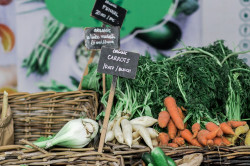Zero miles to our mouths: shortening food supply chains
Food keeps us fueled up and healthy, but it’s also about culture and tradition. “In the last century, we’ve developed food processing and packaging, and we’ve become able to get amazing products,” says Richard Canady from the White House Office of Science, “But we tend to produce food farther and farther from where we need it. Now we can go back, producing things locally, thanks to technology. We all understand that production is needed close to where people live.” youris spoke to Canady at the latest global food innovation summit Seeds & Chips in Milan, where former US President, Barack Obama, made a speech on food security and climate change. This year Canady created the foundation Food Intelligent Grids, which studies “smart” food systems in urban contexts. The researchers are aiming to get farmers, food processors and consumers networking better, using physical and virtual data. “The fundamental need of people in relation to food is always the same: nutrition. The new thing is that, thanks to big data, we can find more efficient ways to move crops from one place to another, reducing distances and avoiding the unnecessary disposal of food”, explains Canady. “I would probably prefer a tomato that is sourced one kilometre away from me, which is fresh and arrives at my table through a trusted high-quality process. We call it smart-grid, a way to optimize supply chain length.” Stimulating innovation and collecting knowledge about short food supply chains are also the focus of the European project SKIN, which involves 14 countries. “Of course, imports remain crucial. In Italy, for example, farm production can meet only half of food demands, which is 60 billion meals every year. The country is only self-sufficient in viticulture and avian areas,” says Daniele Rossi from Confagricoltura, an organisation representing Italian agricultural businesses, which is collaborating with the project. But short chains can enhance consumer satisfaction, boosting local employment and saving biodiversity. “The peculiarities of some regions impose to try stopping as soon as possible the dereliction of the countryside”, he adds. First of all, there’s safety in numbers: “We are working on the creation of collective brands of agricultural entrepreneurs, networks of farmhouses and other aggregation systems,” explains Rossi. Furthermore, technology can give a helping hand. The digital training of the agricultural entrepreneurs involved is one of the aims of the project, to give them the chance to interact directly with consumers, creating new possibilities of engagement. The last few years have seen the proliferation of online platforms that create new tech-bonds between producers and consumers, to fill some physical gaps. One of the successful examples is La Ruche qui dit Oui (“the beehive that says yes”, in French), founded in France in 2011. “Our sharing-economy platform is a site where people can order local products directly from farmers and food producers,” explains founder Marc-David Choukroun. Although offering only local products may appear to be limited, the web platform is now active in nine countries. “In six years our producers have taken 84 percent of the sales revenue, compared to 15 to 25 percent if they sold through most supermarkets”. But does this mean that the role of traditional supermarkets will be drastically affected? “In the context of short chains, supermarkets will be smaller and will be able to survive with organic, local, ethical and healthy products”, says Giuseppe Caprotti, former CEO of the supply chain Esselunga, which opened the first supermarket in Italy 60 years ago, with the support of the US businessman Nelson Rockefeller. Read more: http://www.shortfoodchain.eu/News/Articles/Zero-Miles-To-Our-Mouths-Shortening-Food-Supply-Chains.kl
Keywords
Food, food supply chain, technology, health, security, climate change, food production, zero kilometre, farmers, short chain
Countries
France, Italy, United States



